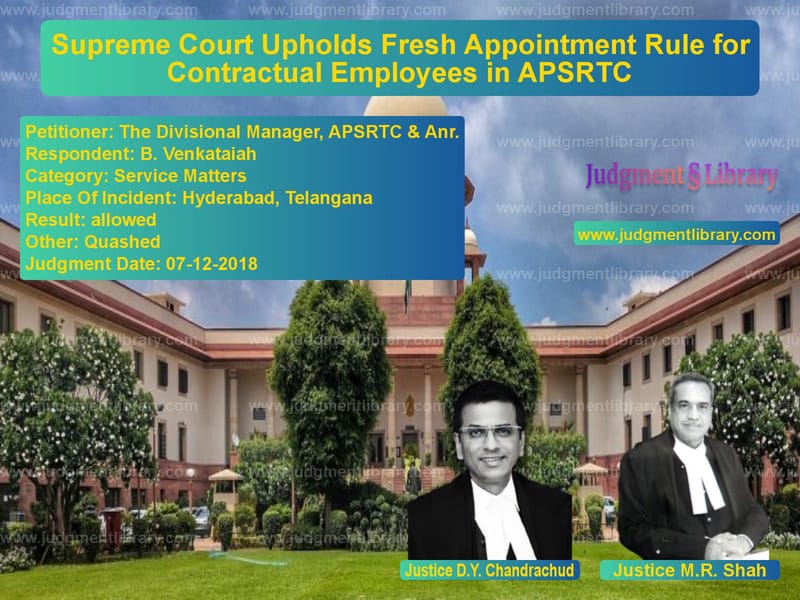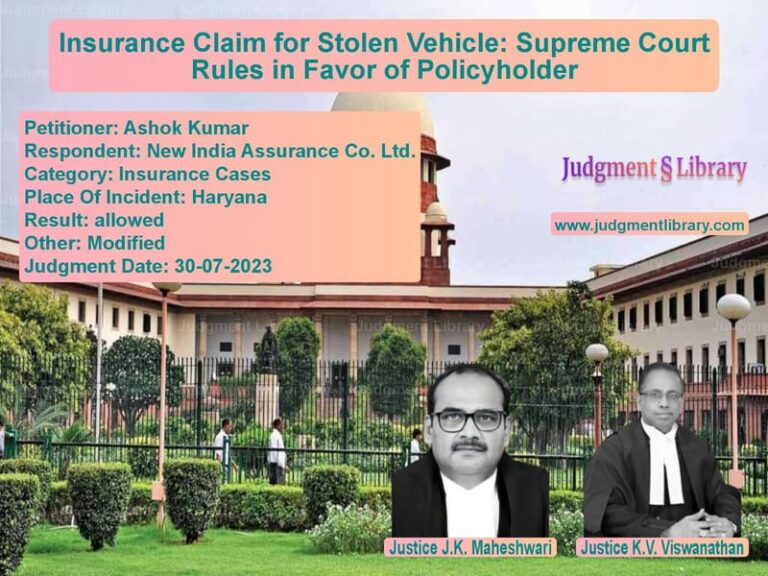Supreme Court Upholds Fresh Appointment Rule for Contractual Employees in APSRTC
The case of The Divisional Manager, APSRTC & Anr. vs. B. Venkataiah revolved around the rights of contractual employees in the Andhra Pradesh State Road Transport Corporation (APSRTC). The Supreme Court, in its judgment dated December 7, 2018, ruled that a contractual driver who had been terminated due to misconduct and later given fresh employment could not claim continuity of service for regularization purposes.
The Court set aside the decisions of the Andhra Pradesh High Court, which had granted the benefit of continuity of service to the respondent. The ruling clarifies the legal position regarding the treatment of contractual employees who have been re-engaged after dismissal due to misconduct.
Background of the Case
The respondent, B. Venkataiah, was initially appointed as a driver on a contract basis at Mushirabad-I Depot, Hyderabad. A departmental inquiry was initiated against him, and following the report of the inquiry officer, his services were terminated.
After dismissal of his departmental appeal and during the departmental review, the Divisional Manager of APSRTC issued an order for his re-engagement on contract on April 27, 2011.
Following his re-engagement, the respondent filed a writ petition in the Andhra Pradesh High Court under Article 226 of the Constitution of India, seeking continuity of service, appointment benefits, and regularization.
Legal Issues Considered
The Supreme Court examined the following key legal issues:
- Whether a contractual employee terminated for misconduct and later re-engaged on fresh appointment is entitled to continuity of service.
- Whether the High Court erred in granting regularization benefits to the respondent.
- Whether termination without challenging the dismissal order affects the employee’s right to claim past service benefits.
Arguments by the Appellants
The appellants, APSRTC and its officials, contended:
- The respondent’s initial termination due to misconduct was never challenged.
- Re-engagement was not a reinstatement but a fresh contractual appointment.
- The respondent was not entitled to claim continuity of service, as he did not seek relief through the Industrial Court.
- The High Court wrongly relied on a previous decision that did not apply to this case.
Arguments by the Respondent
The respondent, B. Venkataiah, countered:
- Since he was re-engaged in service, he should receive benefits of continuity.
- The High Court had rightly ordered APSRTC to count his past service for regularization.
- Other similarly placed employees had been granted regularization benefits.
Supreme Court’s Judgment
The Supreme Court, comprising Justices D.Y. Chandrachud and M.R. Shah, ruled in favor of APSRTC and overturned the High Court’s decision. The key observations included:
- “A contractual employee terminated for misconduct and later re-appointed on contract cannot claim continuity of service.”
- “Unless the termination order itself is set aside, the employee cannot be granted regularization benefits.”
- “Granting continuity of service to an employee re-engaged after misconduct places him on the same footing as regular employees, which is unfair.”
- “Since neither the termination nor the fresh appointment was challenged, the grant of service continuity is not legally sustainable.”
Key Takeaways from the Judgment
- Termination Order Must Be Challenged: Employees dismissed for misconduct must contest their termination before seeking continuity of service.
- Fresh Appointment Does Not Grant Past Benefits: Re-engagement on a new contract does not entitle an employee to previous service benefits.
- Misconduct Cannot Be Overlooked: Courts will not treat employees terminated for misconduct the same as regular employees.
- High Court Erred in Granting Regularization: Judicial intervention must consider the distinction between reinstatement and fresh contractual employment.
Final Directions
The Supreme Court ruled:
- The High Court’s order granting continuity of service was set aside.
- The respondent’s seniority would be counted only from his fresh appointment date.
- The APSRTC was not required to provide past service benefits.
Conclusion
This judgment reinforces the principle that contractual employees who are dismissed due to misconduct cannot claim past service benefits upon re-engagement. It ensures that fresh appointments are treated separately from reinstatements and prevents misuse of judicial orders to gain undue benefits.
The ruling also highlights the importance of challenging termination orders if employees seek relief. It serves as a precedent for similar cases where employees attempt to claim benefits of prior service after being dismissed for misconduct.
Petitioner Name: The Divisional Manager, APSRTC & Anr..Respondent Name: B. Venkataiah.Judgment By: Justice D.Y. Chandrachud, Justice M.R. Shah.Place Of Incident: Hyderabad, Telangana.Judgment Date: 07-12-2018.
Don’t miss out on the full details! Download the complete judgment in PDF format below and gain valuable insights instantly!
Download Judgment: The Divisional Manag vs B. Venkataiah Supreme Court of India Judgment Dated 07-12-2018.pdf
Direct Downlaod Judgment: Direct downlaod this Judgment
See all petitions in Employment Disputes
See all petitions in Termination Cases
See all petitions in Public Sector Employees
See all petitions in Judgment by Dhananjaya Y Chandrachud
See all petitions in Judgment by Mukeshkumar Rasikbhai Shah
See all petitions in allowed
See all petitions in Quashed
See all petitions in supreme court of India judgments December 2018
See all petitions in 2018 judgments
See all posts in Service Matters Category
See all allowed petitions in Service Matters Category
See all Dismissed petitions in Service Matters Category
See all partially allowed petitions in Service Matters Category







